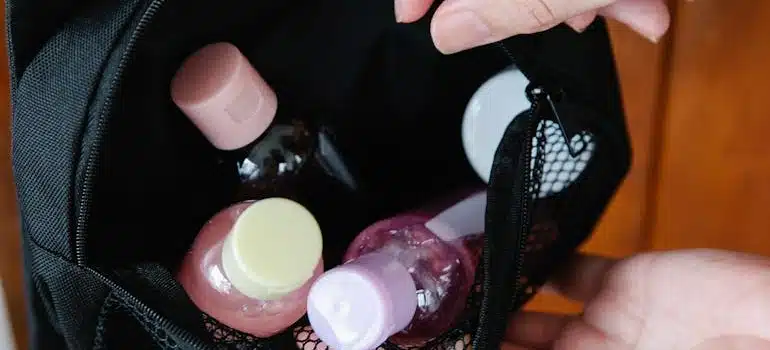Packing liquids for an interstate move
Unlike solid items, liquids can spill, leak, or cause damage if not packed properly. Some are even banned by moving companies due to safety regulations. Hence, packing liquids for an interstate move to or from Florida takes extra planning. If you’re preparing for a move across the Sunshine State lines soon, this Pro Movers Miami guide will help you decide which liquids to pack, how to secure them, and when it’s better to leave certain items behind.
Know which liquids are allowed across state lines
Before you begin packing, ask your Miami moving company which liquids they accept for interstate moves. Long-distance trips increase the risk of spills and damage, so restrictions are often tighter than for local moves. Even if something seems harmless, it may not be permitted on the truck if you’re crossing state lines.
Reputable and licensed interstate moving companies in Miami may allow sealed shampoo bottles, unopened cleaning supplies, or new pantry items. But they usually won’t take gasoline, bleach, alcohol, or anything flammable. Pressurized containers, like spray cans or aerosol cleaners, may also be banned. These items can explode or leak due to heat or pressure changes during travel.
Always check your mover’s list of restricted items. To stay compliant, refer to the Federal Motor Carrier Safety Administration (FMCSA) guidelines. This step helps you avoid delays, fines, or ruined shipments.

Use containers that won’t leak on long trips
Liquids need extra protection during a long-distance relocation. Choose packing containers that won’t break down or soak through. Plastic bins are best for packing liquids for an interstate move. They contain leaks and offer better durability than cardboard.
Seal every bottle tightly. Wrap the caps with tape or plastic wrap to prevent drips. You can also place bottles in large zip-top bags for another layer of protection. Don’t overfill bottles. Leave some space for pressure changes, especially in hot weather.
Label every box clearly. Write “Liquids – This Side Up” to keep items upright and alert the movers. This is especially important if your boxes will be in a truck for several days.
Sort and reduce what you pack
Cross-country moves take longer, cost more, and involve more handling. That makes it even more important to reduce how many liquids you transport and save on interstate moving costs. Begin by checking all liquid containers in your kitchen, bathroom, and storage areas. Discard anything expired, leaking, or rarely used.
To avoid waste, donate sealed and usable products instead of throwing them out. Here are some good options:
- Local shelters: Accept sealed hygiene items like shampoo, lotion, or body wash
- Food banks: May take unopened kitchen liquids like oil, sauces, or drinks
- Recycling centers: Handle household chemicals, paint, or used oils
- Community centers: Sometimes accept sealed cleaning products
Decluttering lowers the risk of leaks and reduces the number of boxes needed. It also makes unpacking easier when you reach your new home in another state.
Replace risky items with safer alternatives
Some liquids just aren’t worth moving, especially over long distances. If an item is likely to leak or cause damage, it may be better to leave it behind and replace it later. Interstate moves involve heat, vibration, and long hours of transport. Even sealed items can become unstable.
Try using safer alternatives for the move. Here are a few ideas:
- Choose bar soap instead of body wash
- Bring only small travel bottles of shampoo or lotion
- Switch from bottled sauces to dry seasoning packets
- Ship replacements to your new home once you arrive
- Use powdered laundry detergent or pods instead of liquid
This strategy helps you avoid packing mistakes, lowers the risk of spills and simplifies your relocation. It also gives you a fresh start with new supplies in your new state.

Keep items upright and separated
During a long interstate drive, boxes will shift around. Keep liquids upright and stable to avoid messes. Add cushioning at the bottom of each container. Use towels, packing paper, or bubble wrap to hold items in place.
Don’t mix different types of liquids in one box. For example, don’t pack food items with bleach or bathroom cleaners. Keep kitchen liquids in one bin, and bathroom items in another. This keeps things organized and prevents cross-contamination in case of a leak.
Secure each box tightly and double-check the labels. Make sure your movers know where these boxes are loaded so they don’t get crushed.
Carry some liquids with you during the move
Not every liquid belongs in the moving truck, especially when crossing state lines. Some items are best transported by car. These include medications, baby formula, skincare products, and personal toiletries.
Keeping essentials close means you’ll have quick access on arrival. You won’t need to dig through boxes, and you avoid damage if something spills in the truck.
If you’re driving, store these items in a leak-proof bin. Keep them upright and out of direct sunlight. If you’re flying to your new location, follow TSA liquid rules. You’ll be limited to 3.4 ounces per container in a quart-size bag for your carry-on.
Local regulations FAQ: Don’t let your liquids get you in hot water
Interstate moves come with more than just miles; they come with rules. These quick Q&As on packing liquids for an interstate move will help you stay leak-free and law-abiding across state lines.
Q: Do state laws affect what liquids I can move?
A: Yes. Some states restrict specific chemicals, flammables, or plant-based liquids. Check state websites or your moving company for item-specific rules.
Q: Are there penalties for packing restricted liquids during an interstate move?
A: Possibly. If discovered, movers may remove the item or report it. In rare cases, violations can lead to fines or delays.
Q: What if my liquid item is legal in one state but banned in another?
A: Movers follow the destination state’s laws. If a liquid is banned where you’re going, they won’t allow it on the truck.
Q: Can I move alcohol across state lines?
A: It depends. Some states allow limited personal quantities, while others require permits. Opened containers are usually not allowed in moving trucks.
Q: Who should I contact to confirm local moving rules?
A: Your moving company is the best first step. For official regulations, check with your state’s Department of Transportation or Consumer Protection agency.

Sealed, sorted, and ready for a cross-country move
Long distances, heat, and handling all increase the risk of spills or damage. Movers also follow stricter rules when crossing state lines, so it’s important to check what’s allowed before you pack. Therefore, packing liquids for an interstate move requires extra care.
Thus, you should reduce what you take, pack with care, and keep essentials close. Use plastic bins, secure caps, and separate boxes by room and product type. For high-risk liquids, it may be smarter to buy new items once you arrive. Those small changes help protect your belongings during a long move and make unpacking easier.
Planning an overstate relocation? Reach out today to get expert packing tips and safe moving supplies designed for long-distance moves!
